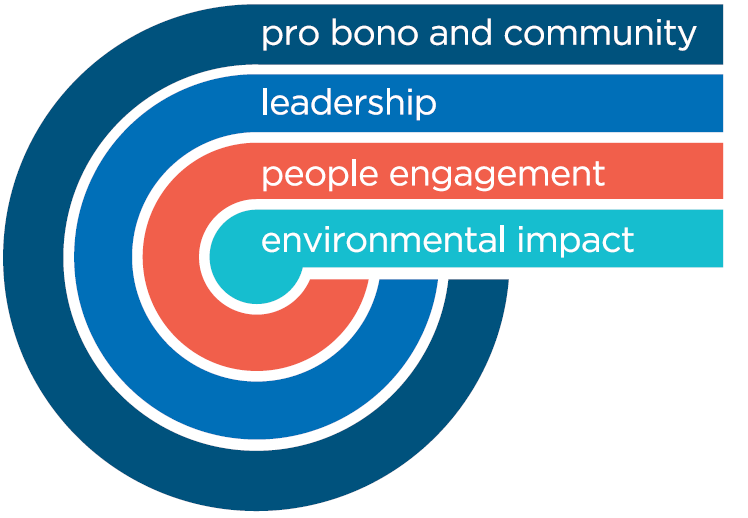As an international professional services business we are concerned about the impact of climate change both on a local and global scale. We work to reduce our environmental impacts by adopting sustainable business and we are committed to deliver challenging carbon reduction targets. And importantly we support our clients making the transition to a low carbon future.
Supporting our Environment Policy is a Global Sustainability strategy, which comprises four focus areas.
We measure, manage and report our most significant environmental impacts to internal and external audiences. Our commitment to responsible business practices recognises that sustainability is an ongoing work in progress. It is work that we undertake with pride, care and diligence, and in a spirit of collaborative learning with our suppliers, our partners and employees, and across the legal sector.
We commit to net-zero emissions
We are committing to reducing our overall greenhouse gas (GHG) emissions and then balancing that lower figure with emissions removed from the earth’s atmosphere to reach a net sum of zero. We are planning to do so in a number of ways, including: using clean energy; working with those suppliers who are also committed to reducing emissions; and supporting initiatives that remove any carbon dioxide that the firm produces from the atmosphere.
Our near-term emission reduction target is backed by science-based targets aligned with the requirements of the Paris Agreement, which seeks to limit global warming to 2° Celsius above pre-industrial levels, but the firm will pursue changes to limit warming to 1.5°, and will be verified by the Science Based Targets Initiative (SBTi), an organisation formed by the United Nations, World Wide Fund for Nature, CDP and others to encourage and measure corporate climate action.
We promote alternative forms of transport and encourage people to cycle to work by providing facilities for cyclists and a way to purchase bicycles tax-free. Every year we celebrate the UN World Environment Day with a series of global awareness raising initiatives over the course of a week.
We are active in business networks seeking to address the challenges of climate change and sustainable development. In 2008, we joined the Legal Sustainability Alliance (LSA) - a collaborative industry effort to address climate change by reducing members’ carbon footprint and adopting environmentally sustainable practices. In 2014 we also joined the Australian Legal Sustainability Alliance.
In addition to our own activities, we contribute to wider efforts to promote environmental sustainability by providing pro bono legal services on key initiatives and other forms of community investment.
Internationally we joined the Legal Response Initiative (LRI), which provides free legal support to the least developed country delegations and NGOs in relation to the United Nations Framework Convention on Climate Change. LRI won the 'stand out' category in the Financial Times Innovative Lawyers Awards 2010.
In the renewable energy area, we have provided pro bono advice to the Government of Sierra Leone regarding a number of solar power projects and the Bumbuna Hyrdoelectric Plant, designed to raise access to electricity on a national scale.
We are working with EcoPeace Middle East, a unique organisation that brings together Jordanian, Palestinian and Israeli environmentalists to advance sustainable regional development is forging a green path towards peace in the Middle East.
Ensuring consistent implementation of the strategy is the responsibility of the partners, senior management and office managers leading two Sustainability Action Groups. One covers North America, Europe, the Middle East and Africa; the other covers Asia-Pacific and Australia.
Through our Global Environmental Sustainability strategy we want to ensure that our interactions with the environment are carefully managed and that we minimise and mitigate any negative impacts from our activities. Integral to the strategy, we have developed an action plan and established some challenging global goals for 2020: to reduce our global carbon footprint by 15%; our energy use by 10%; and our paper consumption by 30%.




